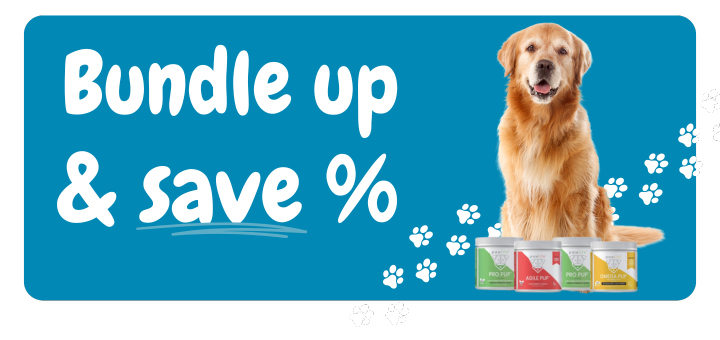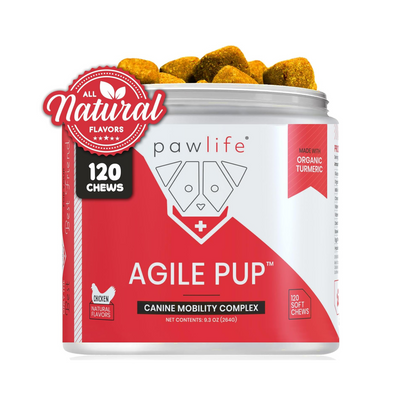Space Heaters & Fireplaces: Keeping Your Dog Safe and Comfortable Indoors
When temperatures drop and the fireplace starts crackling or the space heater hums to life, your home becomes a cozy retreat from cold weather. But while these heat sources help keep you warm, they can also introduce safety risks for your dog. Curious noses, wagging tails, dry winter air, and fluctuating temperatures can create hazards you may not immediately notice.
Dogs instinctively seek warmth — especially seniors, short-haired breeds, toy breeds, or those with joint stiffness. That’s why you'll often find them curled beside a heater vent or sprawled in front of the fireplace like royalty. But TOO close can mean burns, discomfort, or dehydration. With a little planning, awareness, and support, you can make winter warmth safe, soothing, and beneficial for your pup.
To help your dog feel their best during colder weather, consider pairing safety strategies with supportive supplements like Agile Pup for winter mobility, Omega Pup for skin and coat support in dry air, and Calm Pup for dogs who experience anxiety around household noises, crackling fireplaces, or storms. This combined approach keeps your dog comfortable from nose to tail.
Why Dogs Are Drawn to Heat
Warmth feels good — and for dogs, the instinct goes deeper than comfort. Heat helps loosen stiff muscles, improves circulation, and feels soothing against joints that may ache in cold weather. If you’ve already read Recognizing Early Signs of Arthritis in Dogs, you know older dogs especially benefit from gentle warmth.
However, many heat sources lack natural boundaries. Unlike sunlight — which eventually gets too warm and encourages dogs to move — artificial heat can remain intense, creating risk.
Risks to Watch For Around Fireplaces and Heaters
🔥 Burns and Overheating
Dogs can accidentally touch glass fireplace doors, metal space heater surfaces, or heating vents. Even brief contact can cause painful burns. Dogs with short coats or thin fur may be at greater risk, especially breeds like Greyhounds, Whippets, Chihuahuas, and senior pets with thinning fur.
🚫 Dehydration and Dry Skin
Indoor heat can dry the air — and your dog’s skin. Itching, flaking, and redness may appear. If you’ve already explored winter skin care for dogs, you know how crucial oils and hydration are. Omega-rich supplements like Wild Alaskan Salmon Oil or Omega Pup help nourish skin and coat from the inside out.
💨 Hot Air + Anxiety Triggers
Some dogs become anxious around crackling wood, glowing flames, or the hum of space heaters. If your dog has shown fear during storms, lightning, or loud noises, they may react similarly to fireplace pops or heater clicks. This is a good time to introduce calming support like Calm Pup to help ease tension and create positive association.
Safe Setup Tips for Fireplaces and Space Heaters
1️⃣ Use Barriers and Boundaries
A sturdy fireplace screen or baby gate keeps your dog at a safe distance. For space heaters, choose models with:
- Tip-over shutoff
- Cool-touch housing
- Motion sensor shutoff
- Stable, wide bases
Avoid heaters with exposed heating elements — curious paws or noses can get burned in seconds.
2️⃣ Create a “Warm but Protected” Comfort Zone
Place a soft, orthopedic bed near (not beside) the heat source — just far enough to prevent overheating while still offering warmth. Older dogs or those with joint concerns may appreciate the added comfort, especially when paired with mobility support from Agile Pup.
3️⃣ Maintain Humidity
Dry winter heat can irritate skin, coat, and breathing. A humidifier set between 30–45% can make a huge difference. Pairing this with omega-rich nourishment from Omega Pup helps restore natural oils and soothe irritation.
Signs Your Dog Is Too Hot
- Panting while resting
- Restlessness or pacing
- Moving away, then back toward the heat repeatedly
- Warm, flushed ears
- Sleeping with tongue slightly out
If your dog displays these symptoms, guide them to a cooler area and offer fresh water. Hydration matters even indoors (more tips in Seasonal Dog Care).
Bonus: Cozy Indoor Activities for Cold Days
If cold weather limits outdoor exercise, keep your dog mentally and physically engaged with:
- Snuffle mats
- Short structured training sessions
- Gentle indoor fetch
- Slow stair climbs (for dogs without joint issues)
- Food puzzles and lick mats
If your pup needs extra mobility help during cold months, Agile Pup supports joints so movement stays comfortable.
A Warm Winter Without the Risks
With thoughtful setup, supervision, and a few simple safety adjustments, your home can stay warm and inviting without putting your pup at risk. Pair winter comfort with hydration, skin support, and mobility-friendly supplements like Agile Pup, Omega Pup, and Calm Pup to help your dog thrive all season long.
Warmth should be peaceful — not risky. With the right care, your pup can safely enjoy every cozy winter moment curled beside you.













